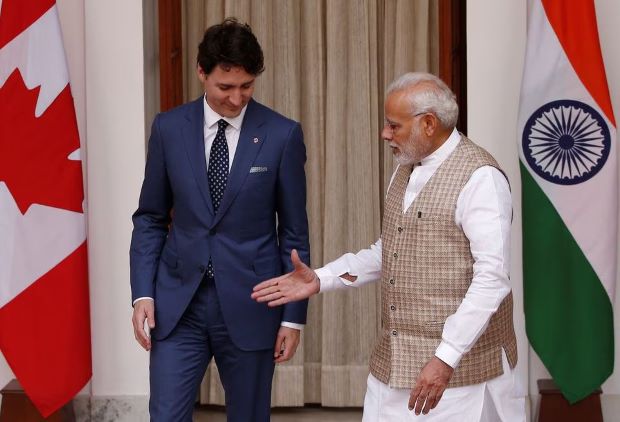India suspends visas for Canadians, escalating clash over Sikh’s killing

By Suhasini Raj and Yan Zhuang
NEW DELHI/OTTAWA – India has suspended visa applications by Canadian nationals, a sharp escalation in the diplomatic conflict that has followed Canada’s claim that Indian agents were behind an assassination in June on Canadian soil.
Arindam Bagchi, the Indian Foreign Ministry spokesperson, described the move as a technical and security issue, saying Thursday (21) that the country’s high commission and consulates in Canada were “temporarily unable” to process visas because of safety threats.
“This has disrupted their normal function,” Bagchi said during a regularly scheduled news briefing, adding: “We will be reviewing the situation on a regular basis.”
But the suspension came as tensions between India and Canada have soared in the days since Prime Minister Justin Trudeau said in Parliament that Canada’s intelligence services had information linking the Indian government to the killing of a Sikh separatist in British Columbia on June 18.
The Indian government on Tuesday (19) forcefully rejected the claim that it had been involved in the assassination of the Sikh Canadian citizen, Hardeep Singh Nijjar, and accused Canada of harbouring terrorists who are seeking to carve a Sikh homeland out of India’s territory.
India then moved to expel a high-ranking Canadian diplomat from New Delhi. Canada had expelled an Indian diplomat — described as the head of New Delhi’s intelligence agency in Canada — the day before.
On Thursday, Bagchi signalled that more Canadian diplomats could soon leave India, in what he called a step to ensure “parity” between the two countries’ diplomatic presences.
“Their numbers here are very much higher than ours in Canada,” he said. “The details of this are being worked out, but I assume there will be a reduction from the Canadian side.”
Canadians have voiced outrage at the possibility that the Indian government had played a role in the killing of a Canadian citizen on Canadian soil. In July, protesters outside the Indian Consulate General in Toronto promoted the Sikh secessionist cause with signs that accused Indian diplomats of being behind Nijjar’s death.
On Wednesday (20), the Indian Foreign Ministry pointed to what it called threats to the safety of its citizens and diplomats. It advised Indian citizens living in or traveling to Canada to “exercise utmost caution” because of what it described as an increase in “anti-India activities and politically condoned hate crimes and criminal violence in Canada.”
“Recently, threats have particularly targeted Indian diplomats and sections of the Indian community who oppose the anti-India agenda,” the advisory said, adding that Indian nationals should avoid travelling to regions and sites in Canada that had seen such incidents.
Dominic LeBlanc, Canada’s minister of public safety, dismissed India’s travel warning in remarks to reporters in Ottawa.
“People can read into that what they want,” he said. “Canada is a safe country. What we’re doing is ensuring there’s an appropriate criminal investigation into these circumstances.”
Canada said Wednesday that its own diplomats had received threats on social media, announcing that it was pulling some of them out of India to ensure their safety.
The Canadian government has yet to release any details about its intelligence findings in Nijjar’s death, saying that doing so could damage the police investigation and reveal the country’s intelligence-gathering methods. Canada has asked for India’s assistance in the inquiry.
“We are not looking to provoke or escalate,” Trudeau told reporters Tuesday. “We are simply laying out the facts as we understand them, and we want to work with the government of India.”
Relations between India and Canada have plunged this week to what officials and analysts call the lowest point in history after years of simmering tension.
The Indian government has long accused Canada and other Western nations of inaction as extremist Sikh groups in the Indian diaspora — including the one led by Nijjar — have supported a secessionist movement that threatens India’s sovereignty.
Canada has said it respects the right of all of its citizens to freedom of speech in advocating political causes. Indian officials say Canadian politicians are reluctant to curb Sikh extremism because of the lobbying sway of the group, the largest population of Sikhs outside India.
Officials in India have accused Canada, Britain, the United States and Australia of standing by as those pushing for what is known as Khalistan, the independent nation that Sikh secessionists want to establish in the Punjab region of India, have vandalized Indian diplomatic missions and threatened Indian diplomats.
Bagchi said Thursday that all categories of visas, including e-visas, would be halted, and that Canadians would be unable to apply for a visa through a third country.
The Indian government had been forced to suspend visas, he said, because of “incitement to violence, the inaction by Canadian authorities and the creation of an environment that disrupts the function of our high commission and consulates.”
-New York Times


Comments are closed, but trackbacks and pingbacks are open.